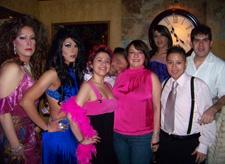This year, Toronto Latino group Hola is celebrating a milestone. Sparked by the AIDS epidemic in the late 1980s, Samuel Lopez and his brother Mario Raul noticed that Latinos were not well informed about AIDS and did not have a group of their own, so they decided to start one.
The resulting organization, Hola, turned 20 this year.
“There was a bar called Colby´s at 5 St Joseph St where groups of ethnic people would gather in different corners to watch drag queen shows. I met a lot of Latinos there, and oftentimes the show was in memory of someone in the community who we had lost to AIDS. I moved to Toronto in 1987, and a year later I already knew someone with AIDS. I became interested in helping out. I realized that Latinos at Colby´s were not well informed. I decided to go inform myself and start a group. My brother [Mario Raul] was interested as well,” Lopez remembers.
At the home of longtime Hola member Ricardo Martinez, Xtra chatted with some of the group’s current members.
Martinez, David Garcia, Paola Solozano, Adriana Pelayo, Rene Lopez — representing three generations of Hola — all say they joined the group for the same reason: out of a need for community. But they all have additional reasons for staying: the fun times, ongoing HIV/AIDS education, and discussion about immigration issues and navigating Canadian society.
“Canada is a fragmented society, and it’s difficult to integrate with the anglophone community, so Hola provides the sense of not feeling alone,” says Martinez, a member for 20 years.
“Hola helps people integrate while maintaining their identity,” says former president Daniel Garcia, a member from the start.
Historically, Hola’s membership has been dominated by gay men, mainly from Mexico. Members have come and gone, and the group has had its highs and lows, nearly disbanding a couple of times. Still, they have toughed it out and grown in many ways.
At its highest point, Hola had 200-plus loyal members. At its lowest, five or six members struggled to keep the group alive. Today, they are 65 and counting. Martinez and Garcia humbly and honestly acknowledge that two points of crisis resulted from “differences” brought on by members’ “egos.”
Martinez believes he has met 2,000 people over Hola’s 20 years, all with different stories and from different countries: Mexico, El Salvador, Peru, Chile, Bolivia, Argentina and Cuba.
“Over the years we’ve always tried to maintain diversity,” says David Garcia.
Hola has diversified in more ways than just having members from different countries. They have moved from being a mostly male space to including people from all branches of the lesbian, bi and trans tree. And December marked the first anniversary of Paolo Solozano’s presidency — the first woman to lead the group.
Solozano remembers thinking, “I’m a woman; who’s going to vote for me?”
She won by a majority, and her presence has brought more women to the group; of its 65 members, 20 are women, the highest percentage in the group’s history.
Hola has gone from offering opportunities to socialize and running workshops on HIV/AIDS prevention to taking part in immigration panels, holding drug and alcohol abuse seminars, battling homophobia, and marching against the Iraq war and alongside Nellie’s women’s shelter on International Women’s Day. Still, get-togethers are a constant. Pride is their biggest event, with a yearly picnic at Toronto Island. The crowning of Miss Hola, Mr Hola and Mr Gay Hola are also popular.
“Socializing is a basic human need. As new immigrants who don’t speak English, who don’t have many friends to go out with, having a space to socialize is critical,” says Solozano. “One of the great things Hola has done over the years is to provide a safe and open space for queer Latinos to congregate.”
Despite its longevity, Hola has no official office and no budget. Ever grateful to the City of Toronto, the Community One Foundation and PLAY for grants and fundraisers over the years, Hola also gives thanks to the 519 Church Street Community Centre for providing a space to meet.
Hola members are proud to point out that the non-queer Latino community does not have a united group like theirs. “There have been many [queer] ethnic groups that aren’t around anymore. They’ve disappeared,” says Martinez. “We’ll continue to exist.”

 Why you can trust Xtra
Why you can trust Xtra


